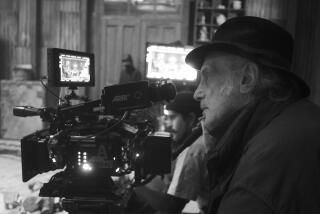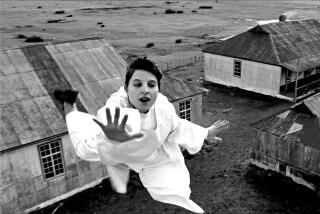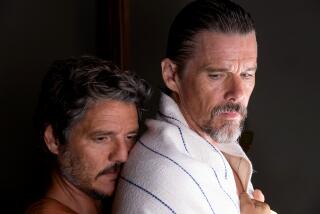Misfit Criminals Find Love in the Nuanced ‘Burnt Money’
- Share via
Marcelo Pineyro’s operatic “Burnt Money” is a gay “Bonnie and Clyde” based on a true story that occurred in Argentina and Uruguay between September and November 1965. It is a bravura work that attests to Pineyro’s command of a style rich in texture and nuance and also of multilayered material.
Pineyro brings such control and passion to his storytelling that he can sustain overheated melodrama verging on camp, evoke grand romantic tragedy and a journey of spiritual redemption and make it play like a classic gangster movie shot with dark humor. It would take a South American, however, to gauge the extent of its historic social and political implications, but it does suggest that the mid-1960s were a period of much corruption in high places for Argentina, something that can be said of many eras in the country’s turbulent history.
Screenwriter Marcelo Figueras has changed names and shaped the material for dramatic purposes, but in essence the filmmakers claim to be faithful to the actual incident.
Fontana (Ricardo Bartis), a veteran bank robbery mastermind, is having second thoughts about the team he’s lined up for his next job. His driver Cuervo (Pablo Echarri) is a coke-head in the midst of a torrid affair with a none-too-serious student (Dolores Fonzi), and he spends the night before the heist on nonstop sex and drugs instead of rest and preparation.
For his stickup men, Fontana has chosen the Twins, an already legendary criminal duo, Nene (Leonardo Sbaraglia) and Angel (Eduardo Noriega). They are a fearless team, but Angel hears voices, and there’s no guessing what they’re going to command him to do next. Nene and Angel have been lovers since they met in a public restroom, but recently Angel has withdrawn from their intense sexual relationship, convinced that God has told him that semen is sacred.
It’s therefore predictable that the robbery will in some way go drastically wrong, although not before the team grabs the loot and heads, as planned, for Uruguay. It is in the limbo of a hideout on the outskirts of Montevideo that the story begins in earnest as the men start unraveling.
As Angel withdraws and continues to disintegrate, Nene gradually becomes involved with a seasoned yet vulnerable prostitute, Giselle (Leticia Bredice); Cuervo, who takes as his role model Vittorio Gassmann’s dangerously seductive playboy in Dino Risi’s classic “Easy Life” (1962), just wants to have fun and dance on the beach with girls in bikinis. The black sheep of a good family, Nene is a reflective renegade, an intellectual with a poetic sensibility, who increasingly realizes that the only thing that means anything at all in his life is his profound and abiding love for Angel.
Pineyro’s three handsome young stars are up to the considerable demands he places on them. Cinematographer Alfredo Mayo gives “Burnt Money” a wonderfully gritty look, and Osvaldo Montes’ sweepingly romantic score is offset with such international pop hits of the day as “Susie Q” and Brenda Lee’s version of “Pretend.” “Burnt Money” represents the bold, confident kind of filmmaking that gets away with everything--think of early Bertolucci, “The Conformist” in particular.
*
Unrated. Times guidelines: much nudity, sex, violence, drug-taking.
‘Burnt Money’
Leonardo Sbaraglia: Nene
Eduardo Noriega: Angel
Pablo Echarri: Cuervo
Leticia Bredice: Giselle
A Strand Releasing presentation of a co-production of Cuatro Cabezas, Tornasol Film, Mandarin and Taxi Films. Director Marcelo Pineyro. Producer Oscar Kramer. Screenplay Marcelo Figueras. Cinematographer Alfredo Mayo. Editor Juan Carlos Macias. Music Osvaldo Montes. Production designer Jorge Ferrari. In Spanish, with English subtitles. Running time: 2 hours.
*
Exclusively at the Fairfax, 7907 Beverly Blvd., Hollywood, (323) 655-4010.
More to Read
The biggest entertainment stories
Get our big stories about Hollywood, film, television, music, arts, culture and more right in your inbox as soon as they publish.
You may occasionally receive promotional content from the Los Angeles Times.










